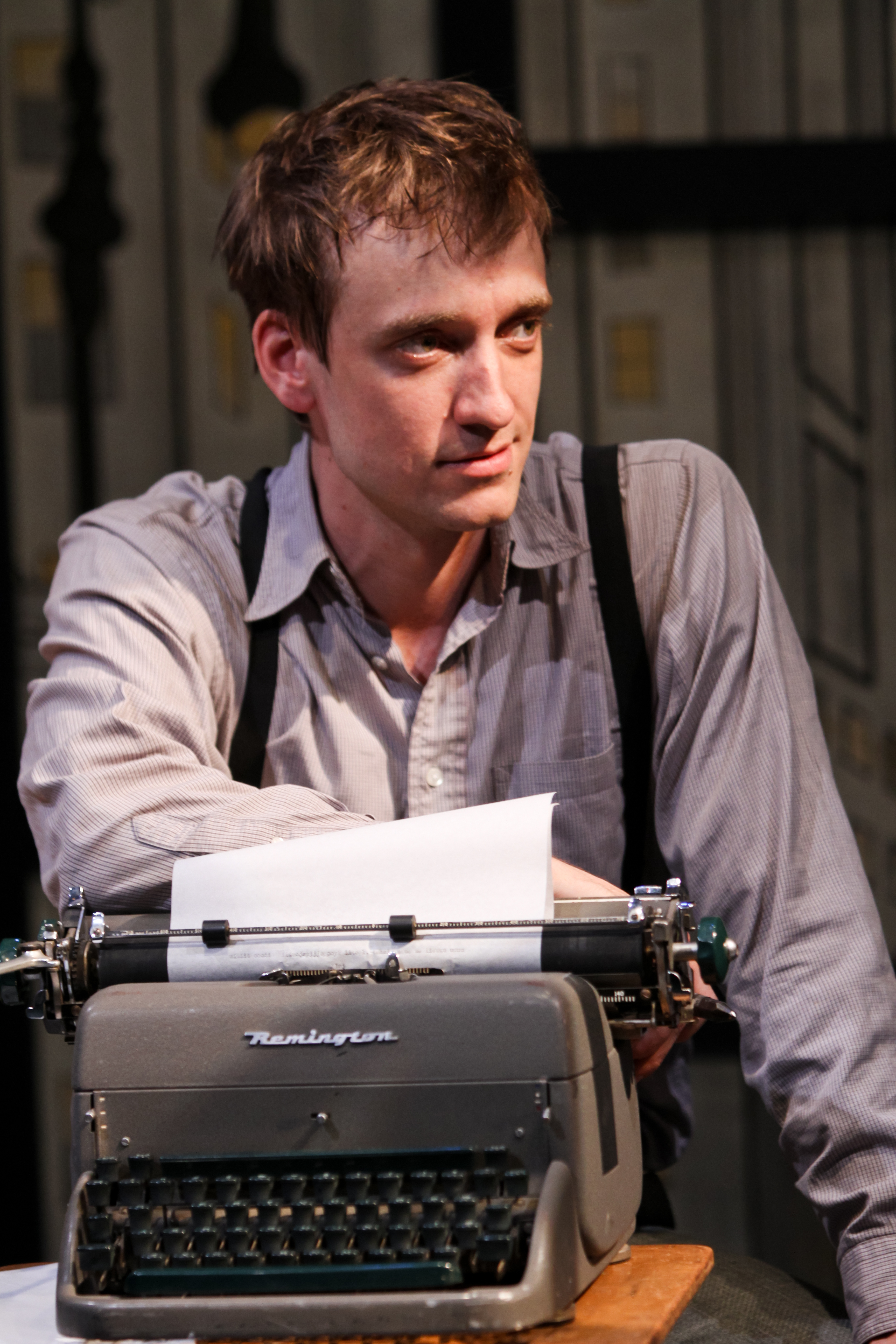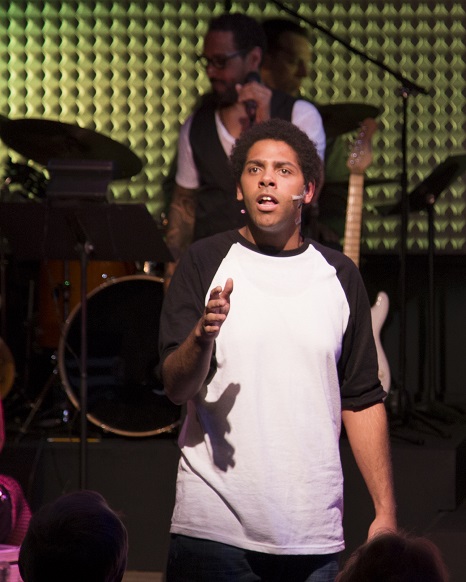Opening Nights
PThe Amazing Adventures
of Kavalier & Clay
Center Theatre at the Armory (Seattle Center), 216-0833, book-it.org. $25–$43. 6 p.m. Wed.–Sat., 2 p.m. Sun. Ends July 13.
Whereas Book-It’s epic past productions of T
he Cider House Rules spread the feast over two nights (several months apart), delivering Michael Chabon’s Pulitzer-winning novel in one five-hour mega-serving makes sense in our age of TV binge-watching. If the audience is going to focus its ADD-ridden brain for longer than a YouTube video (so the logic goes), it might as well gorge on one jumbo-sized wallop. And indeed you should. This production—in which two superhero-obsessed cousins encounter the harsh and exhilarating realities of the real world (1938–’50s) through a comic-book filter—brings emotional KAPOW!s aplenty. Incredibly, after four one-hour acts separated by two intermissions and a dinner break, you could even ask for more.
Not having read Chabon’s 2000 book, I don’t know how the two leads compare to their characters on the page. Yet here we have a dream team of moxie and melancholy from David Goldstein, as Brooklyn-born Sammy Clay, and Frank Boyd, as Czech-born Josef Kavalier. Boyd in particular goes from strong to extraordinary as Josef alters his ambitions to fit wartime and postwar circumstances. Nate Kelderman, who plays Kavalier’s younger brother in the old country (and later his son), perfectly mirrors Kavalier’s wary intelligence. Other memorable performances among the 18-member cast include Opal Peachey as shared romantic interest and activist Rosa Saks and Robert Hinds as the radio actor who voices one of the superheroes.
Directed by Myra Platt from an abridged script by Jeff Schwager, Kavalier & Clay obviously requires some audience endurance. The third act is where the setups start to pay off in spades, so if the early acts seem slow, hang in there. And the show, despite its bulk, can be surprisingly nimble thanks to Christopher Mumaw’s ever-morphing sets. Legions of flats depict towering buildings and bland suburbs, straight from the imaginations of adventure-craving youth. Live musical accompaniment by Micahel Owcharuk and Beth Fleenor helps evoke our heroes’ quick-changing moods. Sometimes we follow them from the map of the known world into pure escapade. In one episode, Peachey doubles as comic-strip heroine Judy Dark, who molts into superhero Luna Moth amid airborne motes like Ben-Day dots. In another, Kavalier bombs through a strobe-storm in Antarctica on a gruesome mission.
The clockwork precision of this complicated adaptation seems a feat of magic in itself. It’s like a trick Kavalier might have tucked up his sleeve to dazzle a captor long enough to escape with his life. Margaret Friedman
The Hunchback of Seville
The Little Theatre, 608 19th Ave. E., 325-5105, washingtonensemble.org. $15–$20. 7:30 p.m. Thurs.–Mon. Ends June 30.
Washington Ensemble Theatre is the Icarus of the Seattle stage scene: aiming high for glory and risking the a spectacular fall. Over the years, WET has skittered back and forth between more accessible shows (RoboPop, Bed Snake) and works that defy an audience to figure out what’s happening onstage. In the latter camp, count Charise Castro Smith’s new one-act. Clocking in at mere 90 minutes, it runs at the pace of an interminable SNL sketch.
The Miami playwright’s farce is set in the wake of Columbus’ discovery of the New World. Back in Spain, circa 1504, his patron Queen Isabella (Maria Knox) is profoundly concerned about the survival of her empire, and rightly so. For starters, she’s dying of some mysterious malady that leaves her short of breath and covered in sores. Worse, next in line for the throne is her schizoid brat of a daughter, the Infanta Juana (Libby Barnard), who’s equal parts shrill enfant terrible and scheming manipulative sociopath.
Who’s the hunchback? Up in her bedchamber—a masterpiece of economy from set designer Cameron Irwin—is Isabella’s brilliant but godless sister, Maxima (Samie Detzer). Isabella could die peacefully if only she can convince Maxima to renounce atheism to become counselor to her daughter, the next queen.
There’s much mixing and matching of anachronisms here, with guns and smartphones deployed, and Smith breaks the fourth wall on numerous occasions. This chiefly allows all-seeing chambermaid Espanta to provide a steady stream of superstitious warnings about what dire possibilities await. (Rose Cano’s Espanta bears more than a passing resemblance to Rosario, the maid from Will & Grace.)
Are there laughs? Yes, there are. But Hunchback packs 10 minutes of humor into an hour and a half. And director Jen Wineman’s reins are too slack: Jokes are consistently overplayed, and the acting styles are all over the map. Detzer’s hunchback speaks like a Valley Girl; Knox plays her monarch like Maya Angelou; and the cartoonish messenger (Benito Vasquez) seems to be from another play altogether.
Of particular mention is an epic tantrum thrown by the Infanta, which outlasts an average Def Leppard drum solo. Onstage, the other players wait patiently for the princess to finish her tirade, some rolling their eyes or with gazes fixed on the horizon. But in the audience, more than a few eyes darted repeatedly toward the exit. Kevin Phinney
PPassing Strange
ACT Theatre, 700 Union St., 292-7676, acttheatre.org. $20–$40. Runs Wed.–Sun. Ends June 29.
Rock & roll doesn’t translate well to the theater. The whole idea of a script is antithetical to the kind of spontaneity—real or imagined—that makes for a great rock show. Then there’s the issue of volume, of particular concern when a stage band performs in a small space with questionable acoustics. They’ve got to play loud enough to relate the musical-autobiographical tale that is Passing Strange, but quiet enough for you to hear the dialogue. That’s the dilemma in ACT’s Bullitt Cabaret, where a PA announcement first asks you to turn off your cellphones, then declares, “Let’s rock & roll!” Cringe.
And yet this local revival of the 2008 Tony winner works really well, conveying the life-altering qualities of sex, drugs, and rock & roll without needing to turn the volume up to 11. The inaugural production of Sidecountry Theatre, directed by Tyrone Brown, this show is ambitious and, at times, rushed during its two and one-half hours (with intermission). And occasionally, yes, the band overwhelms the dialogue. But when it takes time to breathe—particularly when its young protagonist is exploring his art or when the characters are experimenting with drugs—the stage floods with a powerful mix of emotion, angst, and humor.
Created by the musician-turned-playwright named Stew (with Heidi Rodewald and Annie Dorsen), Passing Strange is basically his life story, though his character is never named. His journey starts in 1976 South Central L.A. before twisting through the marijuana cafes of Amsterdam and the riot-torn streets of Berlin. Our protagonist narrates his path, interspersed with songs and episodes from his life (enacted by a cast of six).
The main role originated with Stew, obviously, and here his shoes are remarkably filled by first-time actor LeRoy Bell, the veteran local R&B singer who had a moment of fame on The X Factor some years back. Bell, a black musician who grew up middle-class, like Stew, is a perfect fit for the role. Even if he’s a little older, at 62 (though looking far younger with his muscles and tats), he came of age in the same era as Stew. This might explain his ease with the material.
The fact that Bell, a professional musician, can sing these songs with nuance and grace is easy to take for granted. You’d almost think they were his own, not written by Stew and Rodewald.
That ease continues into Bell’s droll narration, so comfortable and relaxed that it’s easy to think he’s riffing on his own life—until a reference to a New York street gives the script away. And when the play’s emotional heft lands on his shoulders alone in the final moments, he carries it to the end, capping an impressive performance. Mark Baumgarten
E
stage@seattleweekly.com





